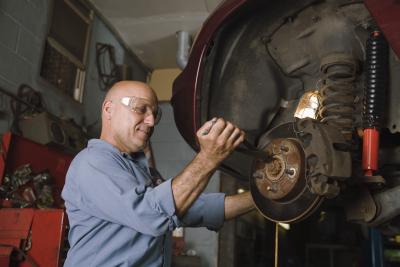
Maintaining good working brake pads is one of the best ways to keep your car running smoothly. Regular replacement of your brake pads is not only necessary for safety, it can save you the expensive costs of replacing your rotors if you let the pads get too thin. There are tell-tale signs when it is time to replace your brake pads.
A scheduled replacement is due. Brake pads can last for thousands of miles depending on how you drive. Each car and brake manufacturer issues different service suggestions, but the average recommendation for regular brake servicing is every 20,000 to 40,000 miles, according to 2CarPros.com, an informational website for car owners. Check your car's service manual or the manufacturer's website if you have already replaced the brakes. If you drive in a lot of traffic, are heavy on the brake pedal or drive in hilly terrain, your brakes might need to be changed sooner than recommended by the manufacturer.
Your brake pads are visually low. If you have basic car knowledge, you know that the brake pads are just inside your wheel. Look through the rims or underneath the car on the opposite site of the wheel to get a look at the pads. If the pad width is less than 1/4 of an inch, it will soon be time to replace the pads. If it is less than 1/8 of an inch, you should replace them immediately.
You hear a squeaking sound from your wheels. This is usually the sound that many people wait for to know it is time to make a trip to the mechanic. Most modern brake pads also have a metallic wear sensor that emits a chirping sound when the pad levels get down to 30 percent of their width. Although this means you still have a good amount of your brake pad left, you should have them replaced soon. If left too long, the pads will wear all the way down to the metal base and cause grooves in your rotors. If you hear a grinding sound when you brake, it has most likely reached this point.
You notice increased stopping distance. If it seems like it is taking your car longer to come to a full stop even though you are applying the same pressure to the brake pedal, it might be time to replace your brakes. Also, if the distance you have to push the brake pedal down to get the car to stop increases, this is a tell-tale sign of the same symptom.